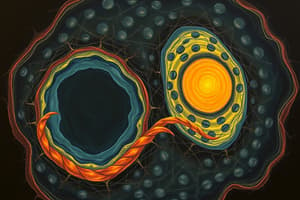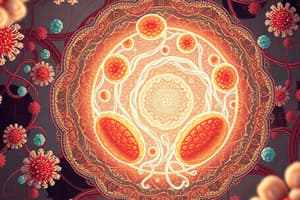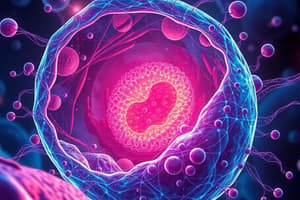Podcast
Questions and Answers
Which of the following organelles is NOT part of the endomembrane system?
Which of the following organelles is NOT part of the endomembrane system?
- Golgi apparatus
- Mitochondria (correct)
- Nuclear envelope
- Lysosomes
How do smooth ER and rough ER differ primarily?
How do smooth ER and rough ER differ primarily?
- Rough ER functions in lipid storage while smooth ER does not.
- Smooth ER is involved in protein synthesis while rough ER is not.
- Rough ER has ribosomes attached while smooth ER does not. (correct)
- Smooth ER is located near the Golgi apparatus whereas rough ER is located near the plasma membrane.
What is the primary function of transport vesicles in the endomembrane system?
What is the primary function of transport vesicles in the endomembrane system?
- To digest cellular waste
- To synthesize proteins
- To transport molecules between organelles (correct)
- To store nutrients and waste
Which of the following accurately describes a role of the Golgi apparatus?
Which of the following accurately describes a role of the Golgi apparatus?
What process does the endomembrane system primarily facilitate within a eukaryotic cell?
What process does the endomembrane system primarily facilitate within a eukaryotic cell?
Which organelle would be least likely to incorporate a fluorescent tag that originates from the outer nuclear envelope?
Which organelle would be least likely to incorporate a fluorescent tag that originates from the outer nuclear envelope?
Which statement is true regarding the interconnection of organelles within the endomembrane system?
Which statement is true regarding the interconnection of organelles within the endomembrane system?
Which characteristic distinguishes rough ER from smooth ER?
Which characteristic distinguishes rough ER from smooth ER?
What role does the rough endoplasmic reticulum play in the cell?
What role does the rough endoplasmic reticulum play in the cell?
Which component of the endomembrane system is specifically involved in the packaging and distribution of proteins?
Which component of the endomembrane system is specifically involved in the packaging and distribution of proteins?
How do transport vesicles function within the cellular endomembrane system?
How do transport vesicles function within the cellular endomembrane system?
What is the primary role of mitochondria and chloroplasts in eukaryotic cells?
What is the primary role of mitochondria and chloroplasts in eukaryotic cells?
What is the primary function of the smooth endoplasmic reticulum?
What is the primary function of the smooth endoplasmic reticulum?
What key feature supports the endosymbiont theory regarding mitochondria and chloroplasts?
What key feature supports the endosymbiont theory regarding mitochondria and chloroplasts?
Which structure acts as the control center of the cell, directing activities by synthesizing messenger RNA?
Which structure acts as the control center of the cell, directing activities by synthesizing messenger RNA?
What components of the cytoskeleton are primarily involved in providing structural support to the cell?
What components of the cytoskeleton are primarily involved in providing structural support to the cell?
What describes the nuclear envelope's structure and function?
What describes the nuclear envelope's structure and function?
Which function is NOT attributed to the rough endoplasmic reticulum?
Which function is NOT attributed to the rough endoplasmic reticulum?
Which of the following organelles is involved in ribosomal RNA synthesis?
Which of the following organelles is involved in ribosomal RNA synthesis?
What is the primary function of the Golgi apparatus?
What is the primary function of the Golgi apparatus?
Which analogy corresponds to the function of ribosomes in the cell-as-factory model?
Which analogy corresponds to the function of ribosomes in the cell-as-factory model?
Which cellular structure interacts with the cytoskeleton to facilitate motility?
Which cellular structure interacts with the cytoskeleton to facilitate motility?
How do transport vesicles function in the cell?
How do transport vesicles function in the cell?
What is the significance of the interconnection of organelles in a cell?
What is the significance of the interconnection of organelles in a cell?
Flashcards
Endomembrane System
Endomembrane System
A network of membranes within a eukaryotic cell that work together to synthesize, store, and export molecules.
Endoplasmic Reticulum (ER)
Endoplasmic Reticulum (ER)
A network of membranes within the cell that can be smooth or rough, involved in biosynthesis and transport of molecules.
Rough ER
Rough ER
ER studded with ribosomes, involved in protein synthesis and modification.
Smooth ER
Smooth ER
Signup and view all the flashcards
Golgi Apparatus
Golgi Apparatus
Signup and view all the flashcards
Lysosome
Lysosome
Signup and view all the flashcards
Vacuole
Vacuole
Signup and view all the flashcards
Transport Vesicle
Transport Vesicle
Signup and view all the flashcards
Endosymbiosis
Endosymbiosis
Signup and view all the flashcards
Mitochondria DNA
Mitochondria DNA
Signup and view all the flashcards
Chloroplast Structure
Chloroplast Structure
Signup and view all the flashcards
Cytoskeleton
Cytoskeleton
Signup and view all the flashcards
Microfilaments
Microfilaments
Signup and view all the flashcards
Motor Proteins
Motor Proteins
Signup and view all the flashcards
Prokaryotic Cells
Prokaryotic Cells
Signup and view all the flashcards
Cellular Motility
Cellular Motility
Signup and view all the flashcards
Endomembrane System Function
Endomembrane System Function
Signup and view all the flashcards
Nucleus Function
Nucleus Function
Signup and view all the flashcards
Nuclear Envelope
Nuclear Envelope
Signup and view all the flashcards
Ribosomes
Ribosomes
Signup and view all the flashcards
Protein Synthesis
Protein Synthesis
Signup and view all the flashcards
Messenger RNA (mRNA)
Messenger RNA (mRNA)
Signup and view all the flashcards
Chromosomes
Chromosomes
Signup and view all the flashcards
Nucleolus Function
Nucleolus Function
Signup and view all the flashcards
Study Notes
Cell Structure and Function
- Cells are the basic unit of life, with varying sizes and structures depending on their type.
- Microscopes are crucial tools to see the minute details of cell structures, both light and electron microscopes.
- Cell theory: all living things are made of cells, and all cells come from existing cells.
Cell Size and Surface Area-to-Volume Ratio
- Cell size is limited due to the need for efficient exchange of materials with the environment.
- The ratio of surface area to volume is critical for cell function.
- As a cell grows, its volume increases faster than its surface area, leading to a decrease in the surface area-to-volume ratio. To sustain efficient exchange, cells remain small to maximize the surface area in relation to its volume.
Prokaryotic vs. Eukaryotic Cells
- Prokaryotic cells (bacteria and archaea) are simpler, lacking a nucleus and membrane-bound organelles. Their DNA is found in a nucleoid region.
- Eukaryotic cells (all other forms of life) are more complex, containing a nucleus and membrane-bound organelles that perform specific functions.
Endomembrane System
- The endomembrane system is a network of membranes involved in synthesis, distribution, and breakdown of molecules within the cell.
- This system includes the nuclear envelope, endoplasmic reticulum (ER), Golgi apparatus, lysosomes, vacuoles, and the plasma membrane.
- Rough ER is studded with ribosomes and synthesizes proteins for secretion or membrane proteins. Smooth ER lacks ribosomes and is involved in lipid synthesis, detoxification, and calcium storage.
- The Golgi apparatus processes, sorts, and packages proteins and lipids for secretion or delivery to other organelles.
- Lysosomes are digestive compartments that break down or recycle materials.
- Vacuoles are involved in maintaining turgor pressure in plant cells and can have storage and digestive functions in some cells.
Energy-Converting Organelles
- Mitochondria are organelles found in all eukaryotic cells, responsible for cellular respiration.
- They convert the chemical energy of food into ATP, the cell's primary energy currency.
- Chloroplasts, found in plants and some protists, carry out photosynthesis, converting light energy into chemical energy of sugars.
- These organelles have internal compartments: intermembrane space (between membranes) and matrix (containing DNA, ribosomes, and enzymes).
Cytoskeleton
- The cytoskeleton is a network of protein fibers (microtubules, microfilaments, intermediate filaments) within eukaryotic cells.
- It provides structural support, facilitates cell movement, and allows for intracellular transport and regulation.
Cilia and Flagella
- Cilia and flagella are cellular appendages used for movement. They are composed of microtubules in a 9+2 arrangement, anchored to basal bodies, and bend via the sliding of microtubules by motor proteins like dynein.
Cell Junctions
- Tight junctions prevent leakage of extracellular fluid across epithelial cells.
- Anchoring junctions fasten cells together into sheets.
- Gap junctions allow molecules and ions to flow between cells.
Cell Walls
- Cell walls are rigid structures external to the plasma membrane, providing support and protection to plant and fungal cells.
- Plasmodesmata are channels that permit communication between plant cells and exchange of materials.
Summary Table
| Category | Organelles | Function |
|---|---|---|
| Genetic Control | Nucleus, Ribosomes | DNA replication, RNA synthesis, protein synthesis |
| Manufacturing, Distribution, and Breakdown | Rough ER, Smooth ER, Golgi, Lysosomes, Vacuoles, peroxisomes | Protein synthesis (rough ER), lipid synthesis & detoxification (smooth ER), protein processing & sorting (Golgi), macromolecule digestion & recycling (lysosomes), storage (vacuoles), metabolism (peroxisomes) |
| Energy Processing | Mitochondria, Chloroplasts | Cellular respiration, photosynthesis |
| Structural Support, Movement, and Communication | Cytoskeleton, Cell wall, ECM, Cell junctions | Cell shape, support (cyto), cell movement & intracellular transport, support to tissue, intercellular connections (cell junctions), protection & support to cell and tissue |
Studying That Suits You
Use AI to generate personalized quizzes and flashcards to suit your learning preferences.




